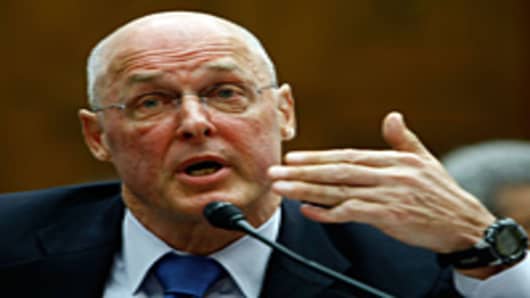After the weekend's International Monetary Fund (IMF) meeting passed with no concrete announcements on the resolution of the Eurozone debt crisis, one analyst called for a "Paulson moment" between politicians and fiscal policymakers in Europe.
Referring to the famous moment when then Treasury Secretary Henry "Hank" Paulson reportedly went down on one knee to House Speaker Nancy Pelosi to try and secure the Democratic Party's support for the Tarp package, Nick Carn, founder Carn Macro Advisors, asked CNBC Monday, "Where's the Paulson moment in Europe? A lot of this is about how to reconcile with democratic processes.
"The main story is the tension between the democratic European processes and this supranational project," he said.
Tensions within the more successful euro zone member states over whether weaker members like Greece should continue to be bailed out have cast doubt on whether politicians such as Angela Merkel can get the latest modifications to the European Financial Stability Facility through.
There are now six weeks until the G20 leaders' summit in Cannes, by which an "action plan" is expected to be lined up, and market volatility looks set to continue between now and then.
European stock markets have plunged in the past three months as uncertainty over the resolution of the debt crisis and even the survival of the single currency grew.
"We have a political process that does not move on enough for the markets," said Carn. "There seems to be some signs of movement in the bigger European blowout, but all we can say about the Greek crisis is it's still ongoing, as it has been for about two years now."
The IMF meeting was "a step in the right direction," Tom Stevenson, investment director, Fidelity, told CNBC.
"European leaders have been cajoled and bullied into showing some leadership.
"Three things are essential: we need to move to primary surpluses; we need to recapitalize banks and we need to reduce the level of debt," he added. "We have to accept that Greece is never going to pay its debt."
Greece may be closer to meeting one of its key targets for the new bailout package agreed in July.
The participation of private sector bondholders in a Greek debt swap plan is nearing 85 percent, taking it closer to the 90 percent target set in July for the deal to go through, according to a report in the Greek daily Eleftherotypia on Monday.
Yet Greece's problems are far from the only negative forces weighing down the market.
"There are three big issues: the euro zone crisis which is most acute; the time at which the US economy will slow down and what's happening in China," said Carn.
He added that the slowdown in world trade from the second quarter this year could be the most important factor in the global economy.
The World Trade Organization has cut its forecasts for world trade this year from 5.8 percent from 6.5 percent after it slowed more sharply than expected, Director-General Pascal Lamy announced earlier in September.



